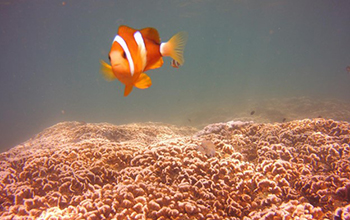搜索结果: 1-7 共查到“海洋科学 how coral reef fish”相关记录7条 . 查询时间(0.14 秒)

Big differences in how coral reef fish larvae are dispersed(图)
Big differences how coral reef fish larvae dispersed
2021/2/5
How the larvae of colorful clownfish that live among coral reefs in the Philippines are dispersed varies widely, depending on the year and season, a finding that could help scientists improve conserva...

Predators and hidey-holes are good for coral reef fish populations(图)
Predators hidey-holes coral reef fish populations
2019/10/17
New NSF-funded research by NC State scientists highlights two factors that play critical roles in supporting reef fish populations, and ultimately in creating conditions that are more favorable for th...
Vertical distribution and ontogenetic ‘‘migration’’ in coral reef fish larvae
migration reef fish larvae Vertical distribution
2014/4/16
Vertical distribution patterns were studied in the community of coral reef fish larvae around Tetiaroa (French
Polynesia) using vertically stratified net tows within the first 100 m of the water colu...
Settling larvae of a small coral-reef fish discriminate reef features at large, but not small, spatial scales
a small coral-reef fish discriminate reef spatial scales
2014/4/21
Larval settlement of a small coral-reef fish, the bridled goby (Coryphopterus glaucofraenum), to five entire reefs
over 4 yr decreased with increasing cover of hard substrate (rock and coral). Experi...
Seagrass nurseries contribute to coral reef fish populations
Seagrass nurseries coral reef fish populations
2014/4/18
We here provide strong evidence that seagrass beds act as nurseries providing fish to adult populations of a coral reef fish. We studied this habitat connectivity by tracing life history movements of ...
Wave-induced water motion and the functional implications for coral reef fish assemblages
Wave-induced water motion functional implications coral reef fish assemblages
2014/5/8
Using a functional approach, we quantified water motion and the distribution of fish swimming modes across five habitat zones and four exposure regimes commonly found on coral reefs. There were major ...
Direct evidence of a biophysical retention mechanism for coral reef fish larvae
Direct evidence biophysical retention mechanism coral reef fish larvae
2014/5/19
We examine the hypothesis that reef fish larvae have some direct influence on their own dispersal and ability to recruit to their natal reef by tracking cohorts of bicolor damselfish (Stegastes partit...

